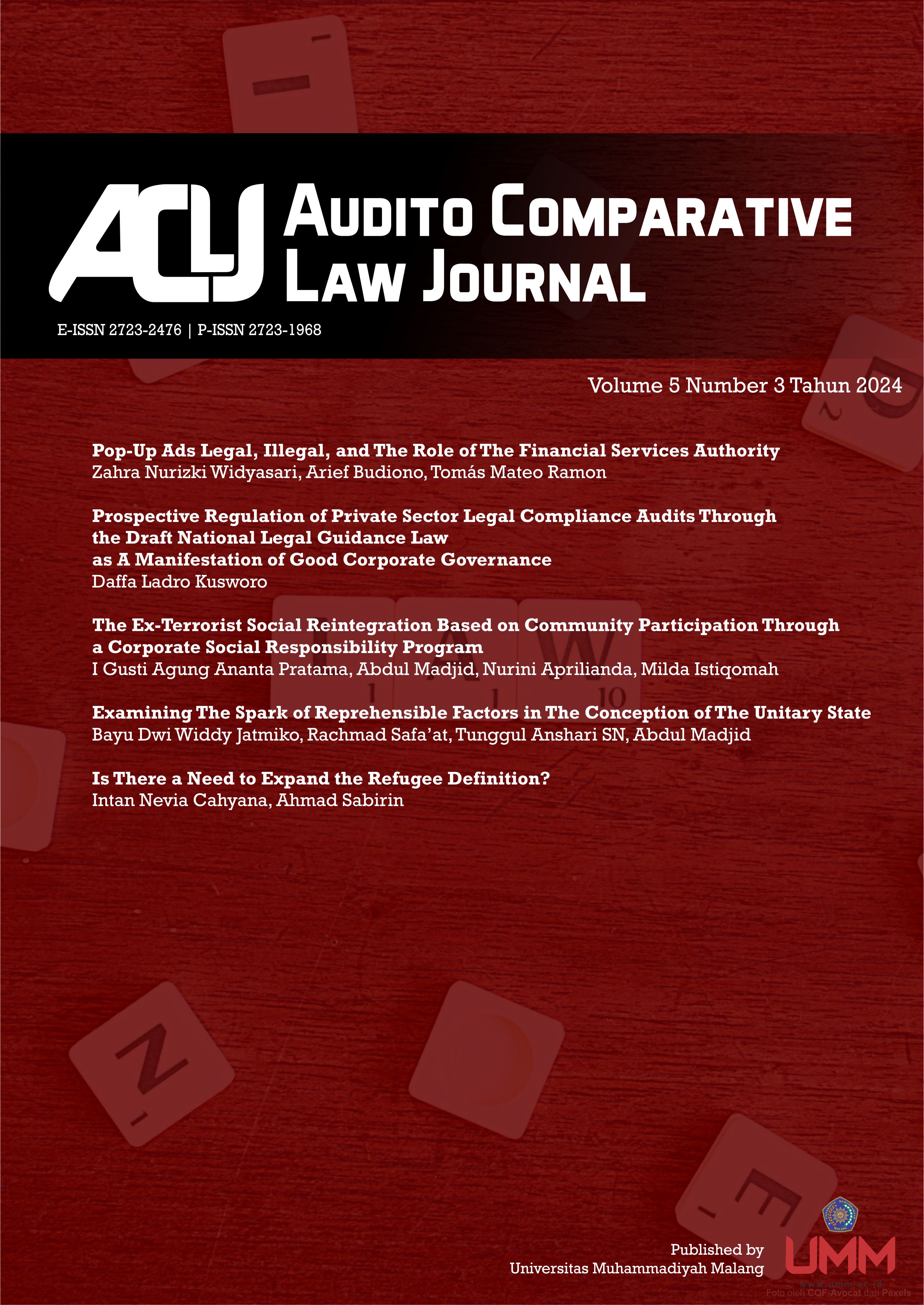Examining The Spark of Reprehensible Factors in The Conception of The Unitary State
DOI:
https://doi.org/10.22219/aclj.v5i3.33514Keywords:
Terrorism; Misdemeanor; Unitary State.Abstract
This article seeks to examine how the regulation of terrorism as a reprehensible act within the scope of special criminal acts in the National Criminal Code and its potential danger to Indonesia's existence as a unitary state. This research is normative juridical research, which uses conceptual and statute approaches based on primary and secondary legal materials obtained through library research. Then, the results are discussed using qualitative prescriptive analysis. The results obtained turned out to show that the regulation of terrorism as a despicable act within the scope of special crimes in the National Criminal Code intended to reinforce counterterrorism and radicalism efforts by including it as one of the special crimes by considering special characteristics. In addition, criminal acts of terrorism also have the potential to endanger the existence and sustainability of the Indonesian state as a welfare state; for that, there is a need for synergy in the role of the government and the people in the state.
Downloads
References
Aditya, Z. F., & Al-fatih, S. (2016). Tanggung Jawab Moral Pejabat Melalui Pemanfaatan Media Cetak dan Elektronik dalam Rangka Penyelenggaraan Pemerintahan yang Bebas dari KKN. Jurnal Universitas Paramadina, 13(1), 1430–1450. https://journal.paramadina.ac.id/index.php/upm/article/view/110
Al-Fatih, S. (2023). Perkembangan Metode Penelitian Hukum di Indonesia - Sholahuddin Al-Fatih - Google Buku (1st ed., Vol. 1). UMM Press. https://books.google.co.id/books/about/Perkembangan_Metode_Penelitian_Hukum_di.html?id=EObiEAAAQBAJ&redir_esc=y
Al-Fatih, S., & Aditya, Z. F. (2019). the Legal Protection Against Terrorism Suspects in Indonesia (Case Study of the Arrest Process of Terrorism Suspects By Densus 88). Legality: Jurnal Ilmiah Hukum, 27(1), 14–26. https://doi.org/10.22219/jihl.v27i1.8954
Al-Fatih, S., Safaat, M. A., Widiarto, A. E., Uyun, D. Al, & Nur, M. (2023). The Hierarchical Model of Delegated Legislation in Indonesia. Lex Scientia Law Review, 7(2), 629–658. https://doi.org/10.15294/lesrev.v7i2.74651
Amar, B. R. (n.d.). Facebook Medsos Paling Banyak Bermuatan Radikal Tahun 2022.
Arifinsyah, A., Andy, S., & Damanik, A. (2020). The Urgency of Religious Moderation in Preventing Radicalism in Indonesia. ESENSIA: Jurnal Ilmu-Ilmu Ushuluddin, 21(1), 91–108. https://doi.org/10.14421/esensia.v21i1.2199
Baranenko, D., Nabokova, O., & Lagoda, K. (2023). Theoretical Foundations of Criminalisation and Decriminalisation of Acts in the Field of Economic Relations. Baltic Journal of Economic Studies, 9(5), 33–41. https://doi.org/10.30525/2256-0742/2023-9-5-33-41
BNPT. (n.d.-a). Pahami Bentuk-Bentuk Radikalisme.
BNPT. (n.d.-b). Partisipasi Aktif Masyarakat Mendorong Penurunan Indeks Resiko Dan Indeks Potensi Radikalisme Dan Terorisme Tahun 2022.
BNPT. (n.d.-c). Strategi Menghadapi Paham Radikalisme Terorisme ISIS.
Butt, S. (2023). Indonesia’s new Criminal Code: indigenising and democratising Indonesian criminal law? Griffith Law Review, 32(2), 190–214. https://doi.org/10.1080/10383441.2023.2243772
Carolina, A. (2019). Deradikalisasi berdasarkan UU Nomor 5 tahun 2018. Jurnal Ilmu Kepolisian, 13(3), 9. https://doi.org/10.35879/jik.v13i3.190
Delegasi Indonesia. (n.d.). The United Nation Conference On Standardization Of Geographical Names.
Djafar, H., Yunus, R., DJ Pomalato, S. W., & Rasid, R. (2021). Qualitative and Quantitative Paradigm Constellation In Educational Research Methodology. International Journal of Educational Research & Social Sciences, 2(2), 339–345. https://doi.org/10.51601/ijersc.v2i2.70
Fahrul Razi. (n.d.). Bantah Wacanakan Pelarangan Cadar di Kalangan ASN.
Fathurrahman. (n.d.). Bentuk Radikalisme Agama.
Haedar Nashir. (n.d.). Paradoks Radikalisme.
Halili. (n.d.). 10 Kampus terpapar Radikalisme.
Indriyany, I. A. (2019). Analisis Sistem Pemerintahan di Indonesia, Masih Relevankah Konsep Negara Kesatuan? Journal of Social Politics and Governance (JSPG), 1(1), 1–13. https://doi.org/10.24076/JSPG.2019v1i1.153
Kaelan. (2009). Filsafat Pancasila, Pandangan Hidup Bangsa Indonesia, Penerbit Paradigma.
KBBI. (n.d.). “Radikal.”
Madjid, Y. R. (2022). Cyber Terrorism Challenges : The Need for a global Mutual Legal Assistance to a Universal Jurisdiction Crime. Yustisia, 10(3), 388–414. https://doi.org/10.20961/YUSTISIA.V10I3.54953
Mahfud.MD. (n.d.). Virus Radikalisme bisa dilawan dengan diskusi Pancasila.
Mahfud MD. (n.d.-a). Cara Ampuh Berantas Radikalisme di Indonesia.
Mahfud MD. (n.d.-b). Radikalisme Ingin Ubah Sistem Dengan Permusuhan.
Marcella Elwina, S. (2010). Sanksi Verbal: Alternatif Jenis Sanksi Pidana Dalam Pembaharuan Hukum Pidana Nasional. Dissertation, Doctoral Program of Legal Studies Universitas Diponegoro, Semarang.
MD, M. (2003). Demokrasi dan Konstitusi di Indonesia. Rineka Cipta.
Miriam Budiardjo. (2008). Dasar-Dasar Ilmu Politik. PT. Gramedia Pustaka Utama.
Monica Ayu Danastri. (n.d.). Cyber Terrorism Dalam Perspektif Undang-Undang Anti Terorisme Dan Undang-Undang Informasi Dan Transaksi Elektronik.
Negara, T. A. S. (2023). Normative Legal Research in Indonesia: Its Originis and Approaches. Audito Comparative Law Journal (ACLJ), 4(1), 1–9. https://doi.org/10.22219/aclj.v4i1.24855
Paikah, N. (2019). Kedudukan dan Fungsi Badan Nasional Penanggulangan Terorisme (BNPT) Dalam Pemberantasan Terorisme di Indonesia. Al-Adalah: Jurnal Hukum Dan Politik Islam, 4(1), 1–20. https://doi.org/10.35673/AJMPI.V4I1.214
Prakasa, S. U. W., Al-Fatih, S., & Bachtiar, H. (2023). Islam and Maritime Security Cooperation Zone for Combating Terrorism: An Overview of Islamic Legal Thought. Mazahib Jurnal Pemikiran Hukum Islam, 22(1), 65–88. https://doi.org/10.21093/mj.v22i1.6134
Prastini, E. (2018). Kebijakan Kriminal Pemerintah Terhadap Kejahatan Dunia Maya (Cyber Crime) Di Indonesia. Jurnal Surya Kencana Dua, 5(2), 332–351. https://doi.org/10.32493/SKD.v5i2.y2018.2341
Rini, R. A. P. (n.d.). BNPT Keluarkan Data Kampus Terpapar Radikalisme, Menristek: Rektor Harus Bertanggungjawab.
Shodiq, D. M., & Djafar Shodiq, S. H. (2018). PARADIGMA DERADIKALISASI DALAM PERPEKTIF HUKUM. Pustaka Harakatuna.
Strong, C. F. (1966). Modern Political Constitution, The English Language Book Society, Sidgwick and Jackson Limited. London.
Sukmana, O. (2017). Konsep dan Desain Negara Kesejahteraan (Welfare State). JURNAL SOSIAL POLITIK, 2(1), 103. https://doi.org/10.22219/sospol.v2i1.4759
Toip Heriyanto. (2007). Paham Negara Integralistik Supomo Dalam Perubahan UUD 1945 (Suatu Kajian Sejarah Hukum, dari Sudut Perkembangan Hukum Tata Negara). Hukum Dan Demokrasi, 5(2), 84–85.
Uchok Sky Khadafi. (n.d.). Dana Program Deradikalisasi BNPT Dinilai Belum Maksimal.
United States Senate. (n.d.). constitution of United States.
Ward, K. (2009). Non-violent extremists? Hizbut Tahrir Indonesia. Australian Journal of International Affairs, 63(2), 149–164. https://doi.org/10.1080/10357710902895103
Downloads
Published
How to Cite
Issue
Section
License
Copyright (c) 2024 Bayu Dwi Widdy Jatmiko, Rachmad Safa’at, Tunggul Anshari SN, Abdul Madjid

This work is licensed under a Creative Commons Attribution-ShareAlike 4.0 International License.








